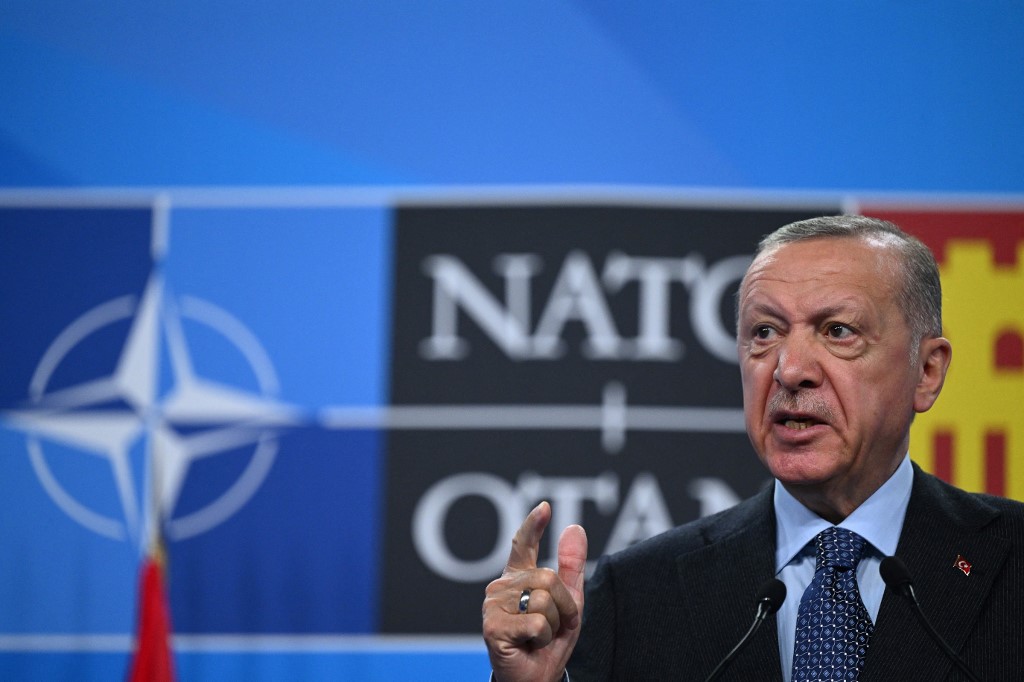The results of an opinion survey conducted by NATO in its member countries show that a majority of Turks think being part of the transatlantic alliance is important for meeting the country’s security challenges.
The field work for the survey was conducted between November 1 and December 6 among 31 NATO allies, plus Sweden. Sweden which became an official member of NATO last week, was not a member of the alliance when the survey was conducted, and therefore data from this country was not included. At least 1,000 participants over the age of 18 took the survey in every country, except for Albania and Montenegro, where at least 500 participants took part.
When asked “How important do you consider the relationship between North America and Europe in dealing with security challenges today?” 72 percent of respondents in Turkey said it was “important” while 12 percent said it was “unimportant,” and the remaining 16 percent said it was “neither important nor unimportant.”
Eighty-two percent of participants alliance-wide found the relationship between North America and Europe in dealing with security challenges “important,” while 12 percent found it “unimportant” and 6 percent said it was “neither important nor unimportant.”
An ongoing war Russia launched on Ukraine in February 2022 has shifted people’s and their countries’ perceptions about the military alliance against security threats. Nordic countries Finland and Sweden abandoned their longstanding traditions of non-alignment and joined NATO in a bid to protect themselves from Russian aggression.
Turks are also among the people of countries where the majority thinks their country should increase its defense spending, with 49 percent saying that more money should be spent on defense. Forty percent of people across the alliance share the same view.
The Turkish government says it is working to reduce Turkey’s dependence on foreign countries for arms and military equipment by investing more in the national defense industry, which has boomed over the past years. Turkey is now one of the world’s main exporters of armed drones.
When asked whether their country should defend another NATO country if it is attacked, 54 percent of Turks replied in the affirmative, while 26 percent objected. Across the alliance, an average of 61 percent of respondents said their country should defend another NATO country if it is attacked.
Seventy-five percent of Turks agreed when asked a similar question as to whether NATO should defend their country if it is attacked, while 10 percent disagreed.
The survey showed a widespread belief among the citizens of NATO member countries, at 61 percent, including those in Turkey, with 63 percent, that being a member of the alliance makes an attack by a foreign nation less likely.
When asked whether they would vote for or against their country remaining a NATO member, 65 percent of Turks said they would vote in favor, while 20 percent would vote against. Sixty-six percent of survey respondents support remaining part of NATO.
Turkey has been a member of NATO since 1952. NATO was established in 1949 by the United States, Canada and several Western European nations to provide collective security against the Soviet Union. It was the first peacetime military alliance the United States entered into outside of the Western Hemisphere.
To another question asking how safe they feel in their country, only 41 percent of Turks said they feel safe, while 49 percent said they don’t feel safe in Turkey. Among all NATO members, 50 percent said they feel safe in their countries while 35 percent said the opposite.
Turks are challenged by a wide range of economic and social problems caused by the high cost of living, with inflation standing above 67 percent in February, and a record number of refugees, in addition to problems related to the rule of law and widespread human rights violations.
The NATO survey showed concerns about the cost of living as the number one challenge, at 58 percent, followed by economic and financial crises, at 37 percent, and climate change or extreme weather, 32 percent, faced by the people of NATO member countries.

